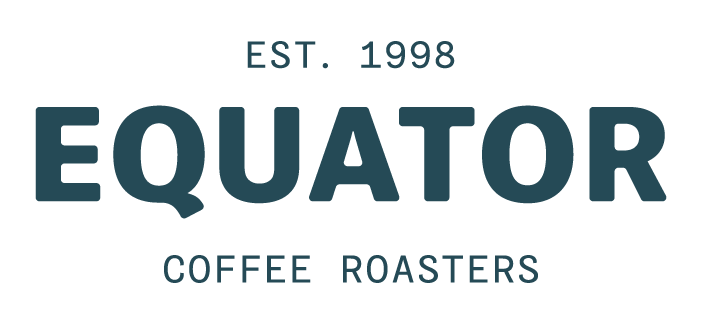
A freshly-brewed cup of Freakin’ Good Coffee, or any of Equator’s coffees for that matter, is without a doubt the best way to start your day. But how are these coffees roasted so freakin’ good? To learn more, I spoke with Justin Houle, Head Roaster at Equator Coffee Roasters, to get some insight into his day-to-day life and see how both his technical skills and passion for coffee are what makes all of our mornings better.
How long have you been a roaster?
I've been a roaster for about 2 years. I started roasting off and on in part to help the previous roaster at Equator for about 6 months and then when he left I took over his position.
What got you interested in the coffee space?
Primarily when I started here it was just as a job, but ultimately, seeing what you can do with specialty coffee, what kind of flavor notes you can get from the beans, which regions have which flavor profiles, all of this was intriguing to me. So ultimately, it became a source of intrigue about what you can actually do with coffee that got me interested in coffee.
What do you enjoy the most about your work?
There are two major things that I enjoy about my job. The first one is realizing how big of a part you play in everyone’s day. Because most people’s days start off with a coffee and if it’s not a good coffee, not a great coffee, then people are kind of, “Eughh, today’s not a great start,” so, yeah, definitely being a part of everyone’s day. But also I enjoy the challenge that comes with my job. Every bean is kind of like a puzzle: you gotta figure out how to best roast it in order to get the best flavors out of the coffee.
Is there any kind of particular education or training required to be a roaster?
There’s nothing formal that says you need to have this certification to become a coffee roaster. The SCA (Specialty Coffee Association) offers courses that will help you along. There are other companies that will definitely give you advice on how to start roasting your own beans. I attended a course in Vermont that was definitely helpful when I took over this position, because it gave me a little bit better foundation to help figure out what I can do with coffee. But ultimately, I found that if you have any background in electrical, mechanical, water systems, gas systems, that can definitely help you along, because a lot of the time your roaster is using some combination of those four systems.
Could you walk me through what a typical day looks like for you?
Depending on days it can vary, but ultimately, you can break it down, as for my position, as: you need to check with the Order Desk, see if there are any new orders that have come in, any that are cancelled, make sure you check with Shipping, see if they need anything right away in order to make sure that those customers’ orders can get out on time. From there, you have to verify your roast plan, make sure you can roast everything in the order that you need it without compromising some roasts. During that time, you’d typically be warming up the roaster anyways, and from there it’s execute the plan: roast the coffee.
How much would you say you roast in a day?
So normally I aim for 14-16 roasts in a day and at the batch sizes we normally roast at, we use about 966 kilograms of green coffee, which comes out to just over 820 kilograms of roasted coffee.
When you roast in a day, do you usually try to make the same beans, or will it sometimes just be different roasts in a day? Do you have to clean the roaster between each one?
I try to keep my roasts varied throughout the day to make sure we don't run too low on any one style of coffee, but there are some days where I have to roast one type of coffee all day because of a larger order that came in. When switching between roasts though, I always try to empty out the cooling tray and destoner as much as possible to ensure there's no crossover of coffees especially when you're switching to a decaf coffee next.
Do you mostly work alone or with others?
My job has the appearance of working alone because I'm kind of off to the side roasting coffee, but I'm part of a 6-person team that works to make sure all the coffee gets out on time. I'm always coordinating with the Order Desk, Shipping/Receiving, and Production Line to make sure everything is going according to plan.
What is the most exciting part about your work?
The most exciting part is kind of figuring out the coffee beans and getting coffee just right: finding the right parameters on your roaster to produce the best coffee ever.
What are your favorite coffee beans to roast versus what is your favorite type of coffee to drink?
My favorite coffee to roast is Ethiopian coffee. It’s always a fun coffee to roast especially through first crack. You get a very pleasant aroma coming off of the beans. Typically it’s very strong fruity notes that are coming off of it. My favorite coffee to drink, though, out of our own coffees: Outlier. There’s nothing wrong with having a simple coffee like that.
Last time we spoke, you said sometimes you have to leave Almonte to go somewhere?
That’s the other part of my position here, in addition to being the Head Roaster, I am also the Coffee Technician for Equator. I'll sometimes get a call and go to any of our customers, clients, or Equator cafes to repair their espresso machines, grinders, water filter systems or brewers, as well as performing regular maintenance.
How do you know which beans you'll be roasting in a day?
So normally that is based off of what I have on our lineup and what we need to roast in order to ship it out. We do operate off of the roast-to-order system, but that is primarily to make sure we’re only sending out fresh coffee or the freshest coffee available. And we do find some trends in and around our numbers of sales that allow us to anticipate any kind of bulk up in weeks that we need to have in order to make sure that we don’t run the risk of leaving people without coffee or sending out orders late.
Is it Craig and Amber who decide from where they source coffees next?
Craig and Amber have the primary say on who we are sourcing our coffees from, especially if we are wanting to source coffee from certain suppliers or Cooperatives, and I'm the person who sources green beans and makes sure we can get what we want. I am normally communicating with Craig and Amber about what they want in a lineup as well as talking with Sales and Cafe Managers to see what our customers want.
How far in advance do you have this lineup?
6 months to a year is the normal timeframe to plan out commitments for lineups.
Do you speak with the farmers themselves?
We primarily go through Coop Coffees who helps with a lot of our sourcing. They communicate directly with the farmers and they help make sure that the coffees are arriving on time and there are no delays in the coffee's arrivals. On occasion Coop Coffee's does host Origin Trips for Roasters as a chance for us to go and visit the farms and mills ourselves and talk with the farmers.
What happens to any of the unsold coffee beans?
Any of the unsold coffee is typically given to our staff, used for machine calibration, or it gets donated to the Ottawa Mission.
How long is coffee actually good for?
We say coffee is good for a year. After about two-to-three weeks you can start to lose some of the nuances in a coffee. Even in unopened bags. Having it in a one-way valve bag sealed like what we do here allows it to off-gas.
If you get a one-way valve bag and bring it home, is it better to keep it in that bag or to put it in an air-tight sealed container?
I would put it in an air-tight sealed container, especially after the coffee is finished off-gassing. That’d probably be your best bet. Most coffees are finished off-gassing after a week, after it’s roasted.
I heard sometimes people store coffee beans in the fridge or freezer. Does that actually do anything to preserve it longer or affect the flavor?
Yes. Storing it in the freezer or the fridge can help extend the lifespan. It can help as long as you make sure it’s in an air-tight sealed container and you’re bringing the entire container back up to room temperature before opening it, because as you can see typically with any cold beverage, something with ice in it, water will condense on the glass, and so it can happen the same with beans: if you open a cold container of coffee beans, moisture’s already starting to get into the container and will form on the exterior of the coffee beans, and the coffee beans will absorb that moisture and ultimately you’re dealing with the problem of rapid degradation of your coffee and, in severe cases, possible mold growth if the coffee gains too much moisture from repeating that process.
What would you like someone who's interested in doing what you do know?
Machines will fail at the worst times, so keep spare parts on hand. I had it happen not too long ago when I was in the middle of a roast and my temperature probe just gave out on me. As soon as it gave out on me, I switched my style to monitoring the roast by the smell and look of the beans as well as keeping in mind what gas changes were supposed to happen in accordance with the batch timer. After the roast, I had an extra temperature probe on hand, so I was able to quickly switch it out and keep on roasting.
